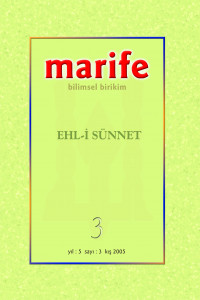Abstract
The main goal of this article is to present the system through which Ebû’l-Abbâs
Nasıruddin Ahmed b. Muhammed b. Mansur el-iskenderi (d. 685/1284), faqih in Maliki
School of Law, man of letters, and mufassir, also known as Ibnü’l-Müneyyir, leveled a
refutation from the perspective of Ahl al-Sunnah understanding of tafseer against the
Mu’tezilite mufassir Ebü’l-Kasım ez-Zemahsheri (d. 538/1144). In this article, we will attempt
to analyze the following issues by referring to Ibnü’l-Müneyyir’s al-intisâf fî mâ
tedammenehû’l-keshshaf mine’l-i‘tizâ, which was written as a refutation against
Zemahsheri’s al-Keshshaf because of the fact that while it criticizes the Mu’tezilite views
in al-Keshshaf it also presents the understanding of the Qur’an and of Tafseer of Ahl alSunnah:
1) Where were the main areas around which Ibnü’l-Müneyyir’s criticism centered?
2) What are the characteristics of Ibnü’l-Müneyyir’s Ahl al-Sunnah defence in
terms of language, style, and evidence?
Abstract
Details
| Other ID | JA55RM28SY |
|---|---|
| Authors | |
| Publication Date | December 31, 2005 |
| Published in Issue | Year 2005 Volume: 5 Issue: 3 |
This work is licensed under a Creative Commons Attribution-NonCommercial 4.0 International License.

